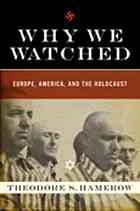
Why We Watched
Europe, America, and the Holocaust
- اطلاعات
- نقد و بررسی
- دیدگاه کاربران
نقد و بررسی

Starred review from June 30, 2008
In this brilliantly conceived and superbly narrated account, University of Wisconsin professor emeritus of history Hamerow (On the Road to the Wolf's Lair
) makes it undeniably clear that anti-Jewish sentiments drastically slowed the response of the United States and other countries to Nazi atrocities when intervention—through diplomacy, loosening of immigration rules and, later, surgical bombing—was entirely possible. Citing opinion surveys from the 1930s and '40s, Hamerow concludes that virtually all Western peoples would have agreed that the world “had to deal with something called the 'Jewish question.' ” Looking at the U.S., Canada, Latin America, Britain and France, the author carefully traces the ancient roots and history of anti-Jewish sentiment, describes the powerful xenophobic lobbies in such nations as the United Kingdom and the United States working against unrestrained Jewish immigration and shows how general skepticism in the United States about reports of mass murder also played a role. Hamerow's important book is more than history: it is an indictment and an essential cautionary tale about how easily bigotry combined with complacency facilitates evil. 30 illus.

July 15, 2008
In this compelling analysis of the Allied response to Hitler's Final Solution to the "Jewish Question," historian Hamerow (history, emeritus, Univ. of Wisconsin; "On the Road to the Wolf's Lair: German Resistance to Hitler") pulls no punches. He argues that at the heart of the tepid reaction to the massive extermination of European Jews was a resilient anti-Semitism that permeated the entire Allied world. Through an exhaustive examination of anti-Semitic sentiment from the prewar years to the Eichmann trial of 1962, Hamerow clearly indicates that throughout the Allied world Jews were considered a clannish and avaricious sect that threatened gentiles. In fact, this anti-Semitic sentiment prevailed until the late 1950s, when it became clear that European Jewry no longer existed. Only then did the Holocaust receive the horrified recognition it deserved. Israeli scholar Shlomo Aronson's "Hitler, the Allies and the Jews" explores similar themes, but Hamerow's study is far more lucid and provocative and deserves a wider audience. Recommended for all academic and public libraries.Jim Doyle, formerly with Sarah Hightower Regional Lib., Rome, GA
Copyright 2008 Library Journal, LLC Used with permission.




دیدگاه کاربران